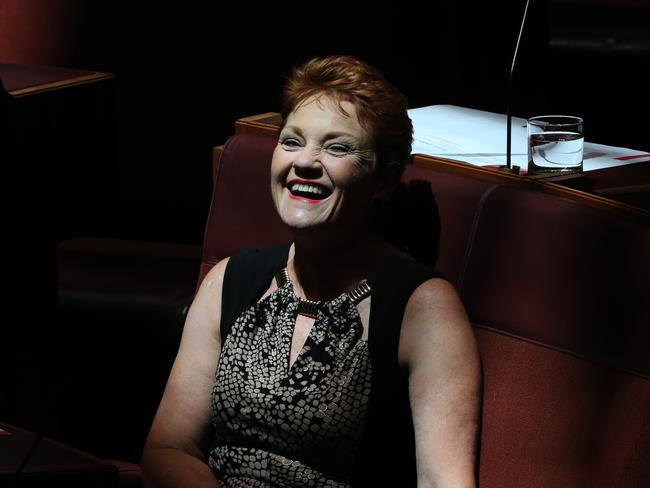At least One Nation can keep its leader for more than three years
SAY what you will about Pauline Hanson, there’s one thing One Nation does better than the major parties. And it’s working.

IT is an iron rule of politics that the person who calls for an end to the bloodshed is always the person who struck the last blow. Peace is rarely an attractive option for the vanquished. Just ask Palestine.
Today the Australian electorate has again been forced to listen to a prime minister falling in the polls blaming it on being undermined by a former prime minister who they themselves had undermined for falling in the polls.
Change the names and you could print the exact same story in the last term of government and the term before that and the term before that.
Of course, when you are knifing people for self-preservation that is one thing — it’s called “politics” — but when you’re knifing so wildly you end up skewering yourself that’s another thing entirely. That’s called madness.
The extraordinary thing is that both major parties have been locked in this death spiral of insanity together. It is like a double helix that destroys life instead of creating it. Call it the Cycle of Knife.
Little wonder then that we have seen plummeting support for the government and a miserable primary vote for the opposition. Meanwhile One Nation has surged from 1.3 per cent at the election last July to five per cent three months later and now doubling to 10 per cent today, according to Newspoll.
Another poll published in the Financial Review over the weekend has One Nation at a staggering 30 per cent in the Queensland seat of Dawson — neck and neck with the LNP’s George Christensen. And if George jumps ship Malcolm Turnbull can kiss his one seat majority goodbye.
Why? The sprawling self-inflicted omnishambles the government created for itself over the past week or so offers a clue, as does Labor’s latest serpentine manoeuvring.
The Australian Banking Association’s appointment of former Queensland Labor premier Anna Bligh as its chief executive in an effort to stop her former comrades holding a royal commission into the banks should have been a walk-up free kick for the Coalition — The workers divided! Mate against mate!
Labor had been girding its loins for a good old fashioned game of roshambo yet ended up watching stunned as the Coalition somehow managed to kick itself in the nuts — a feat once thought physically impossible.

It is as though every time the government gets handed a grenade to lob at the opposition it simply pulls the pin and drops it down the front of its trousers.
Meanwhile Labor has continued to offload its principles with the usual gay abandon. Last year it was absolutely committed to the independent umpire it set up to determine penalty rates. This week it is planning legislation to ensure the umpire is never independent again.
Now I strongly disagreed with the Fair Work Commission’s decision to cut Sunday penalty rates but passing laws to nobble a quasi-judicial body just because you disagree with it is a recipe for disaster. I know this because last year Labor said so itself.
As Groucho Marx famously said: “These are my principles. And if you don’t like them … well, I have others.”
Both parties have long taken a similar approach to policies — remember John Howard’s “non-core promises” and Kevin Rudd’s “greatest moral challenge of our time” — but these were often in response to financial or political constraints. In the case of the GST, Howard actually took a politically toxic decision because he believed it was the right thing to do. Rudd gave up on climate change action after being famously “ratf*cked” by the Chinese, not to mention the Greens.
But now both parties are increasingly changing their policies based entirely on popular sentiment. Turnbull simply dumped tax reform in the too hard basket and Labor pretty much dumped asylum seekers there too. On the key principle issue of gay marriage, each leader has literally swapped positions with the other.
And when that all gets too confusing and the polls go down, then the parties simply swap leaders. The latest mail is that Peter Dutton is now the frontrunner to replace Malcolm Turnbull. What particular problem the Liberal party thinks this will solve is beyond me.
In other words, the two major parties change their policies to whatever is popular at the time and if that doesn’t work they change their leaders to whoever is popular at the time. And then they accuse other parties of being populist.
Now I am a staunch believer in centrist two-party politics but as Ray Hadley is fond of saying, that’ll do me.
Voters don’t expect parties to represent everything they believe in but they do expect the parties to believe in something. Their leader might be a good place to start.
Likewise, people don’t vote for One Nation because they agree with everything it stands for. They vote for it because at least they know what it stands for.
Say what you like about One Nation, it’s got the same leader it did 20 years ago.
The so-called stable parties can’t even keep theirs for three.




